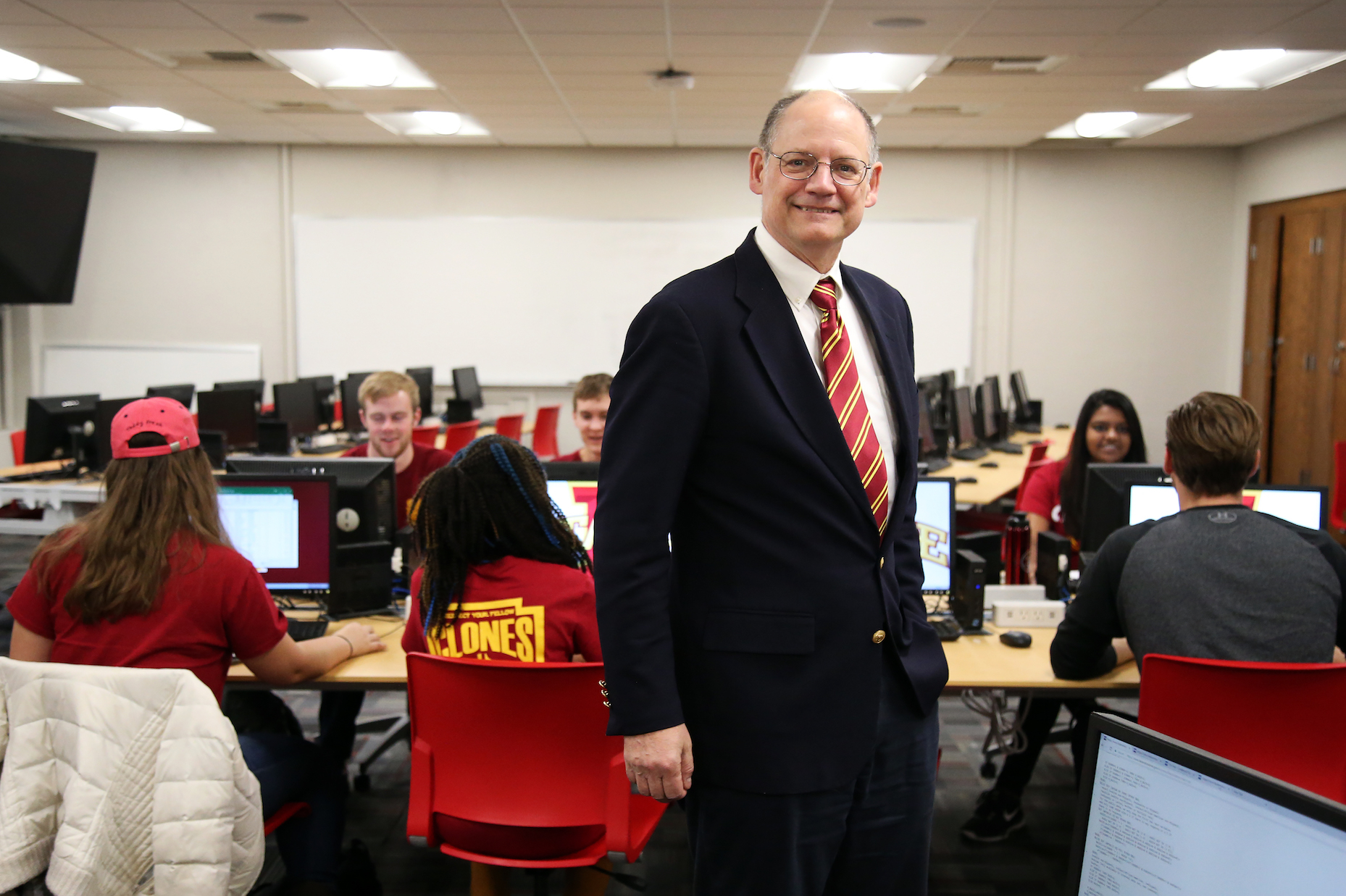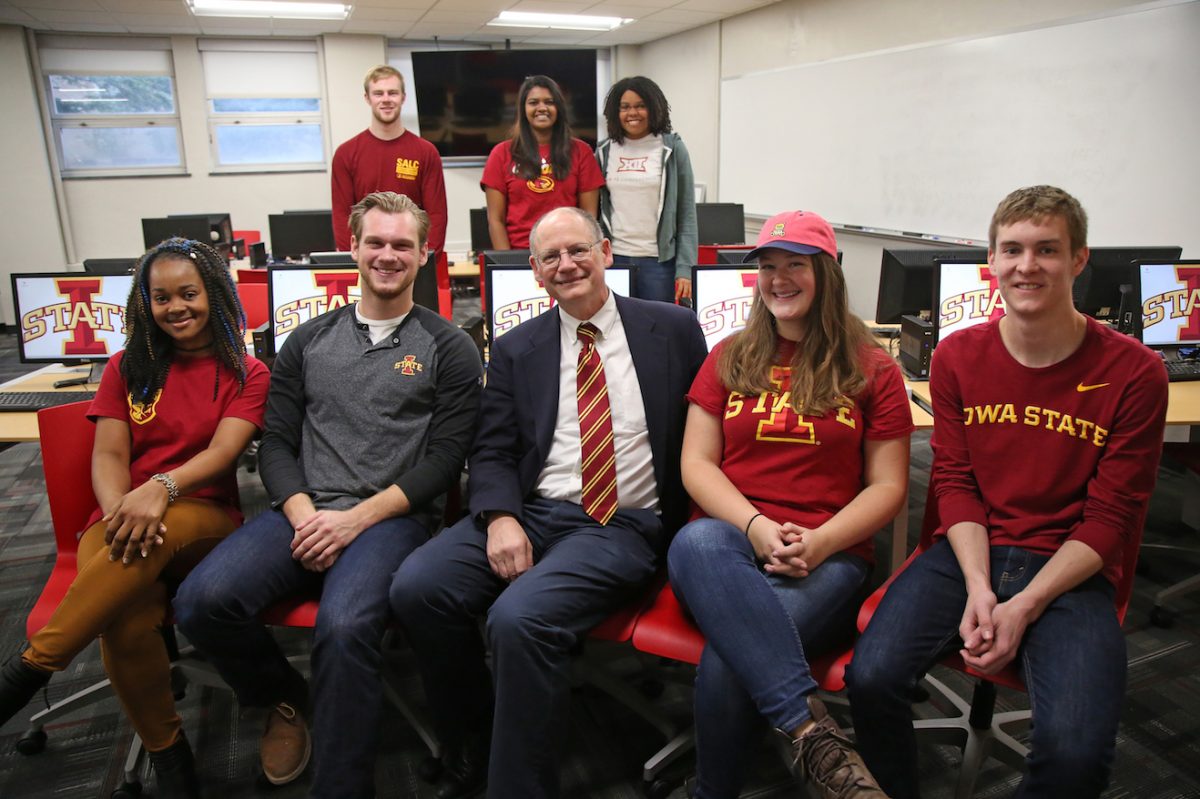It is a Saturday morning, and this group of Iowa State University undergraduate students is up early. Not for tailgating. Not for work. But for an entirely voluntary academic endeavor: undergraduate research.
Three years ago, Peter Orazem, University Professor in the College of Liberal Arts and Sciences and professor of economics, began hosting a Saturday morning breakfast club in Heady Hall. Students start arriving mid-morning each week, ready for a few hours of data sets and donuts. They work on research projects ranging from Japanese land transactions to the Iowa Lottery and risk preference, all with one-on-one support from Orazem and graduate students.
Gerald Healy ('17 economics) learned about the breakfast club in Economics 490, an independent research class.
"I was always interested in numbers, but you only learn so much in class," he said. "When you do research, you apply it."
Breakfast club does offer other motivation. Free food, donated by Orazem, makes Saturday morning research a little more appetizing. The real incentive though comes from the opportunity to do something unique as an undergraduate student.
"It gives students a chance to move in a direction they wouldn't get in a classroom," Orazem said. "Out of 36,000 students, our students can say that they are the only ones who have participated in this particular thing."
"It's a great resume item for undergraduates."

As the student body has increased, the breakfast club helps keep research personal. Skyler Schneekloth ('18 history) once assumed research was something only graduate students did.
"It's a great resume item for undergraduates," he said. "I thought it was mostly graduate students who did the research. I never knew there was this much of the undergraduate student body participating in research projects and actually publishing them."
Schneekloth is collaborating with doctoral student Katherine Lacy and a multidisciplinary group of faculty advisors for his research paper on variables that impact farm size. By May, he hopes to have a completed paper for a journal submission.

"Professor Orazem provides the economic counsel, Anna Peterson [senior lecturer in statistics] is helping me with empirical methods, Associate Professor Kathleen Hilliard [history] has provided useful sources I'm using in my bibliography and Professor Pamela Riney-Kehrberg [history] is my writing counsel," Schneekloth said.
During breakfast club, students can ask Orazem or Lacy for assistance if they get stuck on a particular aspect of research. Orazem usually stays every Saturday until the last student leaves, even if it is two o'clock in the afternoon.
"We do triage and we go from student to student to help them with what they're doing," Orazem said. "We're actually running it even in the summer because we have students who are working on projects in the summer."

In exchange for his early morning efforts, Healy learned how to use the software program Stata, presented a paper at the Midwest Economics Association in Cincinnati and added valuable experience to his resume. Other breakfast club alumni have placed in national case competitions, earned jobs with the Federal Reserve Bank, presented research at national meetings and have been accepted into graduate programs.
"Overall, it was a fantastic experience," Healy said. "You meet new people, you learn about other people's projects, you work on your own project. You learn a lot about overall research and analytics that you can apply to your future."
Charity Elijah ('18 economics) said the breakfast club has strengthened her determination and persistence during her first experience doing research.
"Even if you don't know what you are doing, the instructors and teaching assistant will sit you down and take you step by step. It's the best way you can learn outside the classroom."
"On Saturday you want to sleep extra, but knowing you have something you are doing every Saturday, it builds me up. It better prepares me for my future, job, career, everything. Even if you don't know what you are doing, the instructors and teaching assistant will sit you down and take you step by step. It's the best way you can learn outside the classroom."
